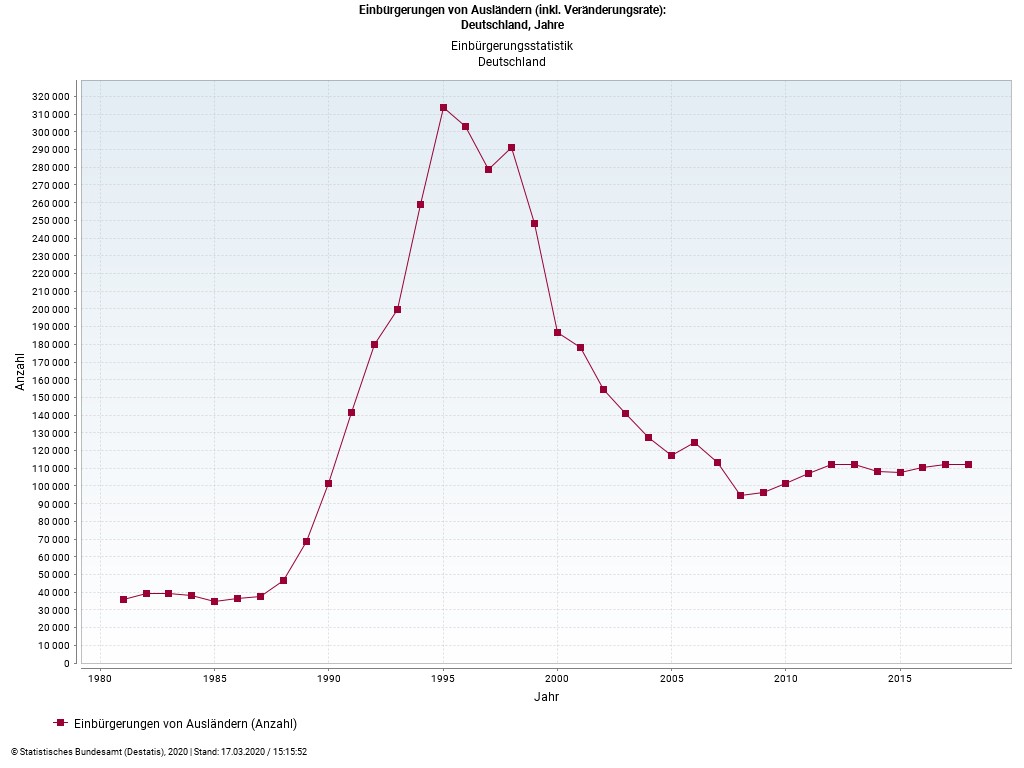The acquisition and loss of citizenship in Germany is regulated by the Nationality Act, which came into force on 1 January 2000. Since the 2007 Reform of Nationality, applicants have to prove German language proficiency at level B1. Since 1 September 2008, applicants must successfully pass a civic integration test for naturalisation.
Residency requirement
A person is entitled to ordinary naturalisation after an eight-year period of habitual lawful residence in Germany (see here for a full list of naturalisation criteria). This residence requirement does not apply to a number of situations. For example, spouses of German nationals can submit their application after two years of marriage and three years of residence according to administrative practice. In addition, spouses must show proof of knowledge of the German language.
Dual citizenship
In principle, Germany does not allow for dual citizenship. Nevertheless, exemptions are made for persons who would face serious disadvantages upon renouncing their original citizenship. In this case, the person will have a permission to retain former citizenship (Beibehaltungsgenehmigung) issued by a German authority. Children born outside of Germany to a German parent, by bloodline or adoption, automatically have German citizenship. This may result in the child having multiple nationalities, depending on the other parent’s nationality and its regulations. For German nationals who acquire the nationality from a European Union Member State or Switzerland, dual citizenship is tolerated. Until the end of the transition period of the UK’s leave from the European Union, German nationals who acquire British citizenship, will be able to maintain their German one.
Language and/or civic integration test
The 2007 Reform of Nationality stipulates that applicants must show German language proficiency at level B1 of the Common European Framework for Languages. Exempt from this provision are persons with illness or disability that prevent them from learning German and also children below the age of 16. Since 1 September 2008, applicants have to successfully pass an integration exam which consists of 33 questions on German history, politics and society (see here for details). Furthermore, persons have to commit to the principles of the free and democratic constitutional order (freiheitlich und demokratische Grundordnung), enshrined by the German Basic Law (Deutsches Grundgesetz). A reform in August 2019 added the requirement to ‘adopt to’ German living conditions (deutsche Lebensverhältnisse). This law specifically addressed the prohibition of polygamic traditions in light of gender equality and monogamous marriage in Germany. Also, applicants must have a clean criminal record for naturalisation.
Application fee
In Germany, the application fee is 255 Euros for adults as well as for children, except if children are being naturalised together with their parents, which reduces the fee to 51 Euros per child. This sum, however, neither covers the costs for the obligatory civic integration exam (25 Euros) nor for the language test (about 100 Euros if passed at the first trial). Depending on the individual case, additional costs may arise from the requirement to submit a certified translation of various certificates, e.g. birth certificate (about 10 Euros); application for expatriation from prior nationality (about 200 Euros); travel fees to consulate/embassy (about 200 Euros); passport (60 Euros) and ID card issuance fees (30 Euros).
Children for the second generation
Children, who are born on or after 1 January 2000 in Germany to non-German parents, acquire German citizenship at birth (‘ius soli’) as long as one parent can prove legal residence in Germany for the preceding eight years with an unlimited residence permit. For children born between 1990 and 1999 it was possible to apply for German citizenship under the birthright principle if the application was filed in the course of 2000. If the child, however, has been born but not raised in Germany and holds another nationality, he or she has to decide between the age of 18 and 23 whether to keep German nationality or not (see here for details on the so-called ‘option duty’). The 2014 reform relaxed the ‘option duty’, so that most children can maintain dual nationality. The law stipulates that children born in Germany to non-German parents that fulfil eight years of residence in Germany before the age of 21, attend a German school for a minimum of six years, or show proof of graduation from a German school or have a professional education in Germany, are considered ‘raised in Germany’ and thus keep dual nationality. These criteria may be waived if the child can prove a comparable socio-cultural link to Germany.
Number of naturalisations in Germany since 1981

Source: Federal Statistical Office Germany (Statistisches Bundesamt)
NB Until 1990: Naturalisation in West Germany prior to German reunification in 1990; Until 31.07.1999: including Spätaussiedler (Spätaussiedler refers to persons of ethnic German origin and their family relatives who lived in Eastern and Central Europe due to expulsion in the post-war period and who thereafter resettled to Germany. Until 1999, the Federal Expellees Act (Bundesvertriebenengesetz) required that German repatriates went through a reception procedure in their country of origin after which they eligible for naturalisation. Since the reform in 1999/2000, however, they are automatically granted German nationality and are exempted from the standard naturalisation criteria, except for that they must prove knowledge of German at the time of emigration).
Data
Some statistics on citizenship acquisitions per year in the period 1981-2018 can be explored through the online data of the Federal Statistical Office Germany.
Our researchers make use of the German Socio-Economic Panel Study (SOEP) provided by German Institute for Economic Research, commonly referred to as DIW Berlin (Deutsches Institut für Wirtschaftsforschung). Since 1984, the SOEP surveys households across Germany and thereby creates a longitudinal panel database which facilitates the tracking of the citizenship status of immigrants who arrived in Germany since then.
More information about citizenship acquisition in Germany
For more information on German Nationality Law, see the Country Profile of Germany on the Global Citizenship Observatory.
Further explanations on the naturalisation procedure in Germany, are provided by the Federal Ministry of the Interior, Building and Community and the Federal Office for Migration and Refugees.